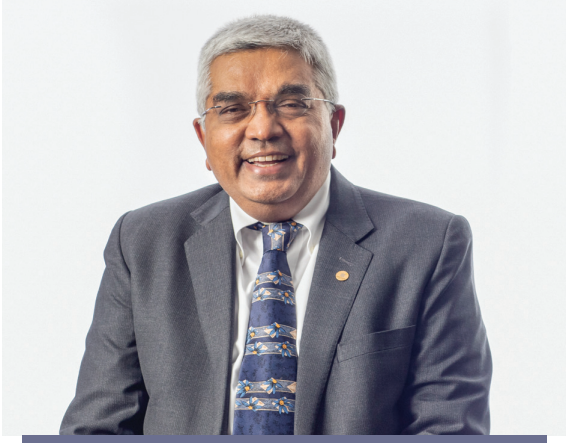Accelerating Sustainability
In the 1990s, I was a graduate student looking at clouds in Antarctica. It was a good time to be in climate studies. Countries were beginning to recognise changes in global climate, and the risks they faced as a result. The Intergovernmental Panel on Climate Change had been formed and began issuing its regular assessments and warnings. It seemed there was a chance to avoid the worst damage by some early action.
That hope has mostly been dashed during the three decades since then. Atmospheric carbon dioxide in parts-per-million-by-volume had already risen to 350 or so when I first encountered it.
Now, it has risen year on year to cross 420, a dramatic increase in the blink of an eye in the life of the planet. And in all the time we have been watching this rising curve, we have done very little to slow its onward march.
This has been the tragedy of the human response to the growing frailty of the planet. The challenges we face in creating and maintaining a liveable environment for ourselves and for future generations were largely known by the 1990s. Indeed, to our shame, it could even be said that many of the solutions to the challenges – lesser consumption, more recycling, improvements in materials science, telecommuting, and many others – have also been known for 25+ years. We have progressed in time without being able to progress our capacity to steward the planet responsibly.
There have been some bright spots. Innovations in every aspect of living are popping up all around us, and the pipeline for these appears very long.
In many fields like energy conservation, waste recycling, traffic management, there are constant efforts ongoing to improve life in the cities. And across the world, there are thought leaders, developers, architects and public officials who can point to successful interventions they have been part of.
But all of this is too little in the face of the vast scale of the problem. Speed is missing.
We are surrounded by good ideas that are taking hold slowly. Rainwater harvesting in cities, even those that face water deficits, is painfully slow. Switching to energy-efficient devices is similarly gradual. Only a very small portion of urban waste is properly collected and recycled. And tons of goods are wasted because of gaps in
supply chains and logistics. In these, and other areas affecting sustainability, we find that the adoption of what is already known is far from what it should be.
There were always two goals within the phrase ‘accelerating sustainability’. But nearly all our attention has been focused only on the second word, and in the process we’ve not sufficiently paid attention to acceleration. Moreover, we have put all our efforts into educating more and more people about the importance of sustainability, hoping that they will help arrest the runaway destruction of the planet. That has not worked.
What if we instead spent more time thinking about acceleration? Could we speed up the adoption of sustainable products and services without trying to sell it as a moral and ecological responsibility? Instead of trying to get more and more people to do the right things for the right reasons, can we simply get them to do the right things for any reason?
I believe this is worth serious thought. It is possible to dramatically increase the number of people choosing to live and work sustainably, because of a very important reason. Most people aren't thinking much about a lot of their buying decisions. We've been trying to change that, hoping they'll become thoughtful and buy the
right things. But why not sell them the right things by simply making them easier to buy? Would that be easier, and work better?
This is the exploration that LVBL is conducting. We believe that it is possible to change the default behaviour of consumers without lecturing them about sustainability. For this, we need five things simultaneously. Information and sustainability; proving new possibilities by doing them; developing a pipeline of innovations in products and services; investing in businesses of the future; and shaping law and governance for a liveable future.
There are examples of these around us, but they’re invariably happening in silos of people and places. Acceleration results from simultaneously and cohesively carrying them out. The climate crisis is a test of human capacity for collaborating to solve a complex challenge.
Cities are the perfect places for this challenge. We are witnessing unprecedented urbanisation of human life, and increasingly in the future cities will have extra-large impacts on sustainability. More importantly, in the global south, cities are still being built. Nearly half of the buildings in India that will exist in 2040 have not been built yet. That's the opportunity.
Developers and architects have vital roles to play in this. A lot of choices in buildings are not made by their end users, but by those who finance and erect the properties. For them, it is much easier to weave in sustainable options for design and construction at the outset. Such options are also becoming steadily more viable and financeable with each passing year, and that presents numerous opportunities to make big switches to sustainability.
There is more. Beyond the construction phase, there is a significant ecological footprint from the way people live and work. The thinking until now has been that making sustainable choices for food, furniture, lighting, travel, etc. will limit one's options, or they will be expensive.
That perception is not changing fast enough, even when the prices are dropping quickly. However, these choices have another quality that is highly valued in the market distinction.
A year ago, someone who had recently bought an electric car explained to me that he'd seen more heads turn to see a moderately expensive EV than to see a highly expensive petrol car. If that's the case, then the environmentally sensible choice is also the financially sensible one. The hope for accelerated adoption of sustainability lies partly in such nuances.
By bringing together a number of sustainable and liveable choices in clusters in neighbourhoods, it is possible to create desirable places to live and work in where the good choices are the defaults. In such places, it would not be necessary to convince people to think about their buying choices and then make responsible
decisions. We would have the satisfaction of seeing them do the responsible things, by default. That could one day save the planet.

– Dr. Ashwin Mahesh,
Founder of LVBL
the neighbourhood improvement company focused on accelerating sustainability. He earlier co-founded the EV-based transportation services, Lithium, and also founded the social technology company Mapunity.

